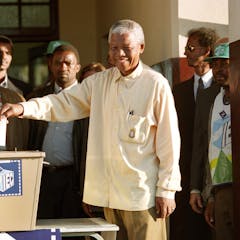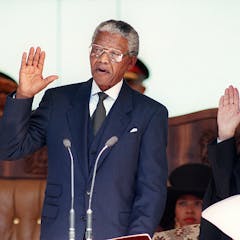
Articles on African National Congress (ANC)
Displaying 1 - 20 of 441 articles

In a matter of days, one Kenyan’s intervention helped give South Africa a peaceful transition to its first post-apartheid government.

The first episode of What happened to Nelson Mandela’s South Africa?, a three-part podcast series on The Conversation Weekly. Featuring interviews with Steven Friedman and Sandy Africa.

A lot of good has happened since apartheid ended in 1994. Sadly, 30 years on, the country is in a political and economic crisis. Many are questioning the choices of the past three decades.

As South Africa heads towards elections, there is no quick fix solution to the electricity crisis in the country. What exactly are the political parties promising voters?

The interviews in this book offer firsthand insights into women’s participation in the armed struggle against apartheid.

Jacob Zuma claims that his new political home, the Umkhonto we Sizwe Party, is the authentic ANC, not the one led by President Cyril Ramaphosa.

The ANC leans heavily on its liberation movement brand. But this will not necessarily be a determining factor in who will sway voters later this year.

Coca-Cola has often been entangled with key political moments in Africa since its arrival in the early 1900s.

The governing ANC’s indifference to constitutionalism has left the constitution vulnerable to opportunistic attack by politicians.

Critics of the 1994 political settlement largely hail from the black middle class, even though it has been one the principal beneficiaries of South Africa’s social democracy.

Opinions differ widely about the true character of the EFF and what it really stands for since it gained seats in parliament in 2014.

Buthelezi should not be dismissed as a mere stooge during apartheid. Yet, he deserves little praise as an advocate for human rights and civil liberties.

The early Nelson comes across as a man consumed by insecurity and ambition, plagued by inner strife and anger.

South Africa needs a new social contract whose core aim is the creation of dynamic economy.

The sites provide a rare tangible record of the international solidarity that existed during the Cold War.

Dissatisfied ANC voters were much more likely to switch their votes if they held positive views of an opposition party. However, the problem for the opposition is that few people held these views.

How Swapo and the ANC respond to any further decline in electoral support will define the future of democracy in both countries.

ANC and EFF differ on ideology and policy – an alliance between them would prove difficult to put together and made to work.

Perhaps the combination of religious rhetoric and secular laws is a winning electoral strategy.

The veteran liberation struggle activist brings gravitas to every position he occupies.
